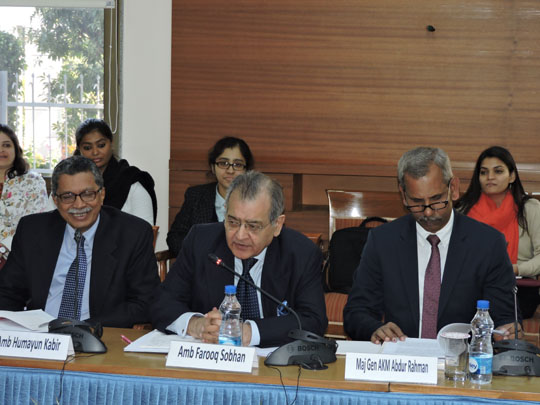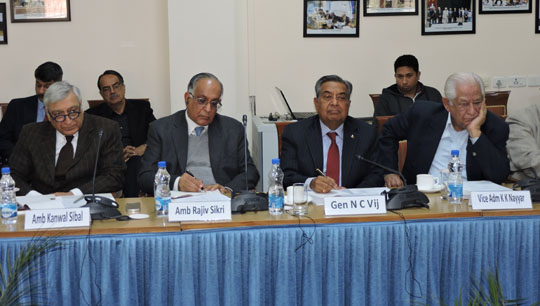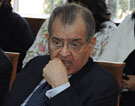A high –powered delegation from Bangladesh Enterprise Institute (BEI) led by its President, Ambassador Farooq Sobhan, visited the Vivekananda International Foundation (VIF) on the 1st of February 2017. The delegation included Amb. M. Humayun Kabir, Vice President, BEI, Major General A.K.M. Abdur Rahman, Director General, Bangladesh Institute of International and Strategic Studies BIISS, Mr. Faiz Sobhan, Brig. General Ziaul Ahsan from the National Security Intelligence (NSI), Brig. General Mohd. Adil Choudhary, Director Directorate General of Forces Intelligence (DGFI) and Mr. Shahab Enam Khan of the BEI. It may be recalled that a delegation from Vivekananda International Foundation had visited Dhaka last year at the invitation of Bangladesh Enterprise Institute.
Welcoming the delegation, Director VIF, General N.C. Vij specially noted the significance of the Indian governments initiative to invite the Bengal Initiative of Multi-sectoral Technical and Economic Cooperation (BIMSTEC) countries at the recently held Brazil, Russia, India, China and South Africa (BRICS) -BIMSTEC Meet in Goa (October 15-16, 2016), strengthening the its “neighbourhood first approach” both in letters and spirit. Director also mentioned the role and responsibilities BIMSTEC and the other platform of Bangladesh, Bhutan, India, and Nepal (BBIN).
 Discussions focused on a range of issues including Bangladesh-India security cooperation, the growing threat perception post bakery attack in Dhaka and areas of connectivity, trade and bilateral growth. The BEI delegation highlighted Bangladesh’s development goals of becoming a middle income country by ‘2021 a reality’. Delegates reemphasized the growing socio-economic and cultural connectivity under the astute leaderships of Prime Minister Sheikh Hasina and Prime Minister Shri Narendra Modi. The successful completion of Land Boundary Agreement (LBA) also featured during the discussion.
Discussions focused on a range of issues including Bangladesh-India security cooperation, the growing threat perception post bakery attack in Dhaka and areas of connectivity, trade and bilateral growth. The BEI delegation highlighted Bangladesh’s development goals of becoming a middle income country by ‘2021 a reality’. Delegates reemphasized the growing socio-economic and cultural connectivity under the astute leaderships of Prime Minister Sheikh Hasina and Prime Minister Shri Narendra Modi. The successful completion of Land Boundary Agreement (LBA) also featured during the discussion.
The visiting delegation expressed concern on (a) difficulties faced by Bangladesh nationals in securing Indian visas; (b) the slow pace of activities under BBIN and BIMSTEC initiatives; (c) a stalemate on Teesta water agreement; (d) lack of progress in the waterways connectivity; (e) non-redressal on the Ganga barrage proposal; (f) border killings by the BSF and erection a barbed wire fencing along India-Bangladesh borders and (g) the declining India-Bangladesh trade graph due to limited access of Bangladesh goods to Indian markets.
 The important concerns from the Indian side mainly pertained to the resurgence of the Rohingiyas around India’s north-east; their alignment with several Islamist-Oriented groups of Bangladesh, Pakistan and Afghanistan. Another area of concern was the rise of religious extremism evidenced by bloggers killings culminated in an intimidation of the liberal thought process in otherwise secular Bangladesh. It was agreed that the killings and the Holey Artisan Bakery attack were the symptoms of the growing radicalization in Bangladesh. Some of the participants also referred to the targeting of the minority population by the radicals and the growing drug menace at the border. On foreign policy issues the perception of Bangladesh’s growing proximity with China also came up for mention.
The important concerns from the Indian side mainly pertained to the resurgence of the Rohingiyas around India’s north-east; their alignment with several Islamist-Oriented groups of Bangladesh, Pakistan and Afghanistan. Another area of concern was the rise of religious extremism evidenced by bloggers killings culminated in an intimidation of the liberal thought process in otherwise secular Bangladesh. It was agreed that the killings and the Holey Artisan Bakery attack were the symptoms of the growing radicalization in Bangladesh. Some of the participants also referred to the targeting of the minority population by the radicals and the growing drug menace at the border. On foreign policy issues the perception of Bangladesh’s growing proximity with China also came up for mention.
Some important take ways from the deliberations were (a) the need for further cementing mutual trust between the two nations, (b) a possibility of Track-2 diplomacy finding its logical conclusion, (c ) progress in exchange of criminals and other wanted persons by both the nations, (d) major thrust on all aspects of trade and connectivity, (e) exploring possibility of joint celebration of December 16th (f) greater alignment between the Indian priorities vis-à-vis Bangladesh’s growth in trade and commerce, (g) revival of waterways and river connectivity and (h) positive role to be played by the media of India and Bangladesh.









